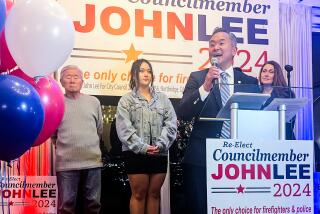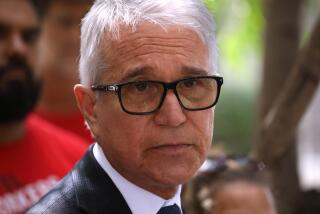Garcetti opens 10-point lead over Greuel in L.A. mayoral race
- Share via
Eric Garcetti has opened a commanding 10-point lead in the Los Angeles mayor’s race over rival Wendy Greuel, whose dogged fight to win the backing of public employee unions appears to be undercutting her on her home turf in the San Fernando Valley, according to a new USC Price/Los Angeles Times poll.
A month before the May 21 runoff, likely voters favored Garcetti over Greuel by 50% to 40%.
The survey also found no sign of success for Greuel’s effort to gain an edge among women by highlighting her potential to make history as the city’s first female mayor. Women preferred Garcetti, 50% to 41%.
FULL COVERAGE: L.A.’s race for mayor
Latinos and younger voters backed Garcetti by still wider margins. The city councilman from Silver Lake has strengthened his standing in the central city and Eastside neighborhoods that he won decisively in the March primary. He has also built a solid lead on the Westside — a key target of Greuel’s.
Perhaps most worrisome for Greuel, the city controller, is her failure so far to establish a base in the Valley, where the two are effectively tied. Greuel, who lives in Studio City, had hoped that audits by her office that found wasteful spending of taxpayer money would appeal to the Valley’s Republicans, often a pivotal vote in L.A. elections.
Instead, Garcetti has emerged with a lopsided lead among conservatives citywide, picking up support from many of those who voted in the primary for Republican radio personality Kevin James, now a Garcetti backer.
L.A. ELECTIONS 2013: Sign up for our email newsletter
Greuel’s tepid support in the Valley, which she represented on the City Council from 2002 to 2009, poses a major challenge for her in the closing weeks of the race. Though Democrats dominate the Valley, many of the city’s Republicans live on its western and northern ends.
“That’s an untenable situation for Greuel,” said Dan Schnur, director of the USC Sol Price School of Public Policy/Los Angeles Times City Election Poll.
Still, even as election officials prepare for the start of mail-in voting on Monday, the contest remains highly fluid, with millions of dollars in TV and radio ads still ahead.
And Greuel holds some clear advantages.
Voters trust Greuel to handle schools better than her opponent would.
“I’ve got kids in school, and I think she’d do more in terms of improving LAUSD,” poll respondent Chris Eisenberg of Sherman Oaks said in a follow-up interview, alluding to the L.A. Unified School District. Greuel often tells voters that her son attends a public elementary school.
A plurality of the voters surveyed also chose Greuel as the candidate who seems genuine and says what she really believes. They picked Garcetti as the one who seems like a typical politician and says things just to get elected.
A plurality also chose Garcetti as the one who cares more about big businesses and developers than Los Angeles as a whole. Greuel has tried to stoke further doubts about Garcetti’s integrity. On Friday, after polling concluded, she started airing a TV ad attacking his personal investments.
Also working in Greuel’s favor is her endorsement by Bill Clinton, with whom she campaigned on Saturday at Langer’s Deli near MacArthur Park. The poll found a majority of voters was more likely to support a candidate backed by the former president. Another of Greuel’s TV ads spotlights her work on disaster relief in the Clinton administration after the 1994 Northridge earthquake.
“People like Bill Clinton, and people like people who are liked by Bill Clinton,” said pollster Chris St. Hilaire of M4 Strategies, the Republican half of the bipartisan team that conducted the survey.
The poll also suggested that African Americans — a key group up for grabs — were tilting toward Greuel. But the poll’s sample size was too small to draw firm conclusions about African Americans, Asians and other groups that can swing a close race.
The telephone survey of 500 likely voters, taken Monday through Wednesday, had a margin of sampling error of 4.4 percentage points in either direction, with wider margins for subgroups.
For Garcetti, the poll offered an abundance of good signs. Likely voters gave him higher marks than Greuel on how he would handle traffic, mass transit, jobs, crime and public safety, always areas of concern for city voters. The results suggested minimal returns so far for one of Greuel’s thrusts: She has vowed to hire about 2,000 new police officers and 700 new firefighters and paramedics and also attacked Garcetti for Fire Department budget cuts.
A plurality of likely voters also chose Garcetti when asked which candidate could make the tough decisions necessary to move the city in the right direction, which would represent every neighborhood and race in L.A., and which had a strong and clear vision for the city’s future.
But it was another major finding that helps explain Greuel’s trouble both generally and in securing a base in the Valley, where hostility toward City Hall fueled a 2002 campaign to secede from L.A.: Voters named her as the candidate who cares more about unions representing city employees than Los Angeles as a whole.
Garcetti has pressed that argument relentlessly, reminding crowds almost daily that a committee controlled by leaders of the International Brotherhood of Electrical Workers has donated more than $3 million to Greuel’s candidacy. Nearly half the money has come from IBEW Local 18, which represents employees of the Department of Water and Power.
The union spending to elect Greuel has opened the way for Garcetti, a staunch liberal, to make his case to Republicans. Greuel made that task easier for Garcetti by attacking him — in private remarks to union audiences — for backing layoffs and furloughs of city workers to balance the budget.
In an overwhelmingly Democratic city, labor remains popular. But the poll found that voters — particularly whites and Republicans, both key constituencies for Greuel — view public-sector unions less favorably than private-sector unions.
While only 33% of white voters viewed unions for private-sector workers negatively, 46% had unfavorable views of public-sector unions. Overall, voters with unfavorable views of public-sector unions favored Garcetti over Greuel, 51% to 36%.
White voters were more inclined than others to say pensions for city workers were too generous. Whites were also more prone to say pension cuts for future city workers would be the best way to reduce the city’s deficit.
Phyllis Owens, 74, a white retired credit manager who lives in Chatsworth, described herself as a pro-union liberal Democrat. But with many Los Angeles residents struggling to save for retirement in a 401(k), she said, the city can no longer afford to hire workers who “stay for 20 years, then draw pensions for 40.”
“Their demands just aren’t in line with what the economy overall can bear,” Owens said. She was leaning toward Garcetti, saying the union money behind Greuel would compromise her independence.
Across the board, Republicans took a dimmer view than whites as a whole toward public employee unions.
To broaden his appeal to Republicans, Garcetti has stressed not just his clash with unions over cuts to the city workforce but also his service since 2005 in the U.S. Navy Reserve and the revitalization of Hollywood and other parts of his district.
“Garcetti has made a lot of gains there since the primary,” Amy Levin of Benenson Strategy Group, the Democratic firm on the polling team, said of the councilman’s inroads among Republicans.
Like Greuel, Garcetti has long been closely aligned with labor. But all of the unions spending large sums to elect him represent private-sector workers, such as janitors and truck drivers.
So far, union spending for Greuel is running about eight times what labor has put behind Garcetti. Greuel’s alliance with public employee unions helped her win the coveted endorsement of the Los Angeles County Federation of Labor.
If Garcetti wins, he will be the fourth consecutive mayor elected without the federation’s support, following Richard Riordan in 1993, James Hahn in 2001 and Antonio Villaraigosa in 2005. Such a victory would also extend a trend of labor rank-and-file bucking leaders of their unions in mayoral contests: The poll found that voters who live in union households backed Garcetti over Greuel, 52% to 37%.
“The most important question of this campaign is whether Wendy Greuel can convince voters that her support from organized labor does not make her beholden to them,” said Schnur, the poll director. “According to these polling numbers, she has not yet done that.”
Times researcher Maloy Moore and staff writer David Zahniser contributed to this report.
More to Read
Sign up for Essential California
The most important California stories and recommendations in your inbox every morning.
You may occasionally receive promotional content from the Los Angeles Times.











